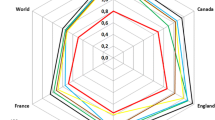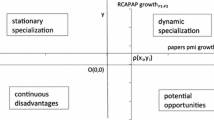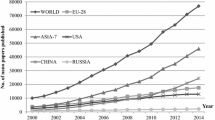Abstract
Based on the Science Citation Index-Expanded web-version, the USA is still by far the strongest nation in terms of scientific performance. Its relative decline in percentage share of publications is largely due to the emergence of China and other Asian nations. In 2006, China has become the second largest nation in terms of the number of publications within this database. In terms of citations, the competitive advantage of the American “domestic market” is diminished, while the European Union (EU) is profiting more from the enlargement of the database over time than the USA. However, the USA is still outperforming all other countries in terms of highly cited papers and citation/publication ratios, and it is more successful than the EU in coordinating its research efforts in strategic priority areas like nanotechnology. In this field, the People’s Republic of China (PRC) has become second largest nation in both numbers of papers published and citations behind the USA.
Similar content being viewed by others
References
Bornmann, L., Leydesdorff, L., Marx, W. (2007), Citation environment of Angewandte Chemie. Chimia, 61(3): 104–109.
Braun, T., Glänzel, W., Schubert, A. (1991), The bibliometric assessment of UK scientific performance — some comments on Martin’s reply. Scientometrics, 20: 359–362.
Braun, T., Schubert, A., Zsindely, S. (1997), Nanoscience and nanotechnology on the balance. Scientometrics, 38: 321–325.
Braun, T., Dióspatonyi, I. (2005), The counting of core journal gatekeepers as science indicators really counts. The scientific scope of action and strength of nations. Scientometrics, 52(3): 297–319.
Braun, T., Zsindely, S., Dióspatonyi, I., Zádor, E. (2007), Gatekeeping patterns in nano-titled journals. Scientometrics, 71(3): 651.
Criscuolo, P. (2006), The ‘home advantage’ effect and patent families. A comparison of OECD triadic patents, the USTPTO and EPO. Scientometrics, 66(1): 23–41.
Dosi, G., Llerena, P., Labini, M. S. (2006), The relationships between science, technologies and their industrial exploitation: An illustration through the myths and realities of the so-called ‘European Paradox’. Research Policy, 35(10): 1450–1464.
Evidence (2003), PSA Target Metrics for the UK Research Base. UK Office of Science and Technology, London, October 2003. Available at http://www.dti.gov.uk/files/file14499.pdf (last visited on 2 February 2007)
Freeman, L. C. (1977), A set of measures of centrality based on betweenness. Sociometry, 40(1): 35–41.
Freeman, L. C. (1978/1979), Centrality in social networks: Conceptual clarification. Social Networks, 1: 215–239.
Granstrand, O. (1999), The Economics and Management of Intellectual Property: Towards Intellectual Capitalism. Cheltenham, UK: Edward Elgar.
Grens, K. (2006), NSF examines plateau in US publications: US scientists’ share of publications is declining in the face of competition from countries like China. The Scientist, 14 November 2006.
Hullmann, A. (2006), Who is winning the global nanorace? Nature Nanotechnology, 1(2): 81–83.
Jaffe, A. B., Trajtenberg, M. (2002), Patents, Citations, and Innovations: A Window on the Knowledge Economy. Cambridge, MA/London: MIT Press.
Jin, B., Rousseau, R. (2004), Evaluation of research performance and scientometric indicators in China. In: Handbook of Quantitative Science and Technology Research, Moed, H. F., Glänzel, W., Schmoch, U. (Eds), pp. 497–514. Dordrecht, etc.: Kluwer Academic Publishers.
King, D. A. (2004), The scientific impact of nations. Nature, 430 (15 July 2004): 311–316.
Kostoff, R. (2004), The (scientific) wealth of nations. The Scientist, 18(18): 10.
Leydesdorff, L. (2005), The scientific impact of China. Scientometrics, 63(2): 411–412.
Leydesdorff, L. (2007), “Betweenness centrality” as an indicator of the “interdisciplinarity” of scientific journals, Journal of the American Society for Information Science and Technology, 58(9): 1302–1309.
Leydesdorff, L. (2008A), Patent classifications as indicators of intellectual organization, Journal of the American Society for Information Science and Technology, 59(10): 1582–1597.
Leydesdorff, L. (2008B), The delineation of nanoscience and nanotechnology on terms of journals and patents: a most recent update, Scientometerics, 76(1): 159–167.
Leydesdorff, L., Cozzens, S. E., Van Den Besselaar, P. (1994), Tracking areas of strategic importance using scientometric journal mappings. Research Policy, 23: 217–229.
Leydesdorff, L., Zhou, P. (2005), Are the contributions of China and Korea upsetting the world system of science? Scientometrics, 63(3): 617–630.
Leydesdorff, L., Zhou, P. (2007), Nanotechnology as a field of science: its delineation in terms of journals and patents. Scientometrics, 70(3): 693–713.
Martin, B. R. (1991), The bibliometric assessment of UK scientific performance — A reply to Braun, Glänzel and Schubert. Scientometrics, 20: 333–357.
Meyer, M., Persson, O. (1998), Nanotechnology-interdisciplinarity, patterns of collaboration and differences in application. Scientometrics, 42(2): 195–205.
Mogoutov, A., Kahane, B. (2007), Data search strategy for science and technology emergence: A scalable and evolutionary query for nanotechnology tracking. Research Policy, 36(3): 893–903.
Mohrman, S., Wagner C. S. (2006), The Dynamics off Knowledge Creation: A Baseline for the Assessment of the Role and Contribution of the Department of Energy’s Nanoscale Science Research Centers, University of Southern California. Los Angeles: Marshall School of Business, Center of Effective Organizations.
Narin, F., Hamilton, K. S., Olivastro, D. (1997), The increasing link between U.S. technology and public science. Research Policy, 26(3): 317–330.
National Science Board (2006), Science and Engineering Indicators. Washington, DC: NSF.
Porter, A., Youtie, J., Shapira, P., Schoeneck, D. J. (2006), Refining search terms for nanotechnology, Journal of Nanoparticle Research, 10(5): 715–728.
Scheu, M., Veefkind, V., Verbandt, Y., Galan, E. M., Absalom, R., Förster, W. (2006), Mapping nanotechnology patents: The EPO approach. World Patent Information, 28: 204–211.
Shelton, R. D. (2006), Relations between national research investments inputs and publication outputs: application to the American Paradox. Paper presented at the 9th International Science Technology Indicators Conference, Leuven, Belgium, 7–9 September 2006; Scientometrics, 74(2): 191–205.
Shelton, R. D., Holdridge, G. M. (2004), The US-EU race for leadership of science and technology. Scientometrics, 60(3): 353–363.
Wagner, C. S., Leydesdorff, L. (2005), Mapping the network of global science: comparing international co-authorships from 1990 to 2000. International Journal of Technology and Globalization, 1(2): 185–208.
Zhou, P., Leydesdorff, L. (2006), The emergence of China as a leading nation in science. Research Policy, 35(1): 83–104.
Zhou, P., Leydesdorff, L. (2007), A comparison between the China Scientific and Technical Papers and Citations Database and the Science Citation Index in terms of journal hierarchies and inter-journal citation relations. Journal of the American Society for Information Science and Technology, 58(2): 223–236.
Zitt, M., Bassecoulard, E. (2006), Delineating complex scientific fields by an hybrid lexical-citation method: An application to nanosciences. Information Processing and Management, 42: 1513–1531.
Author information
Authors and Affiliations
Corresponding author
Rights and permissions
About this article
Cite this article
Leydesdorff, L., Wagner, C. Is the United States losing ground in science? A global perspective on the world science system. Scientometrics 78, 23–36 (2009). https://doi.org/10.1007/s11192-008-1830-4
Received:
Published:
Issue Date:
DOI: https://doi.org/10.1007/s11192-008-1830-4




